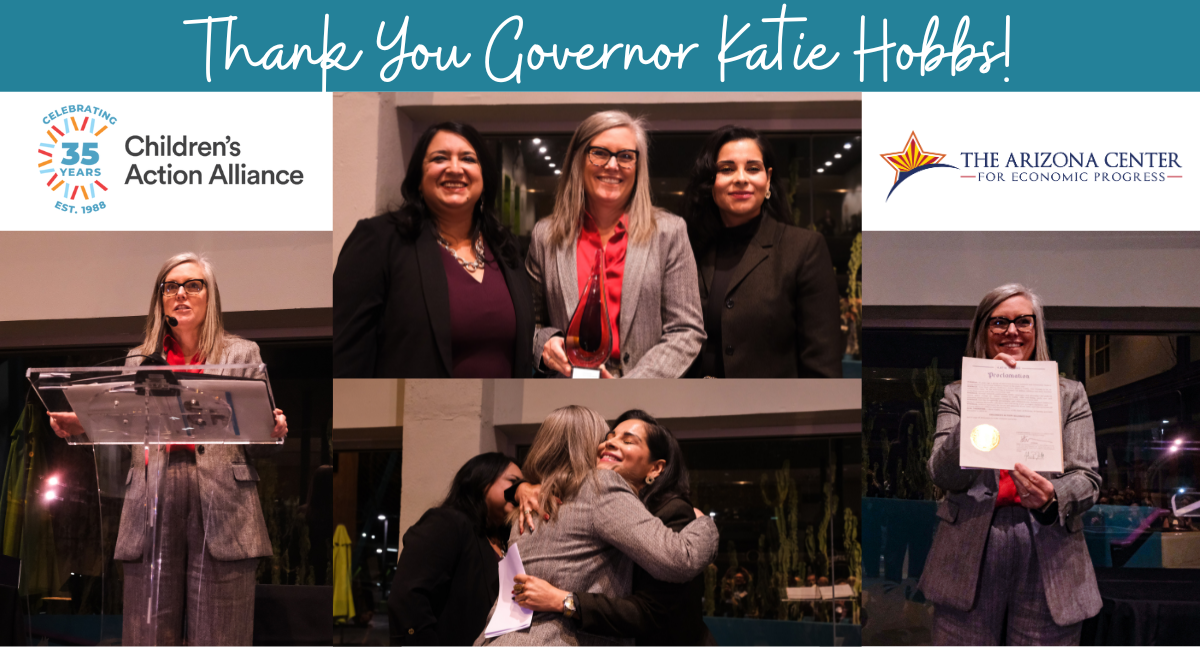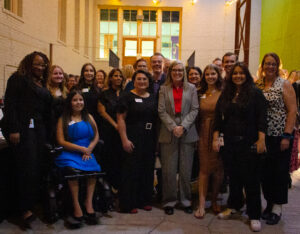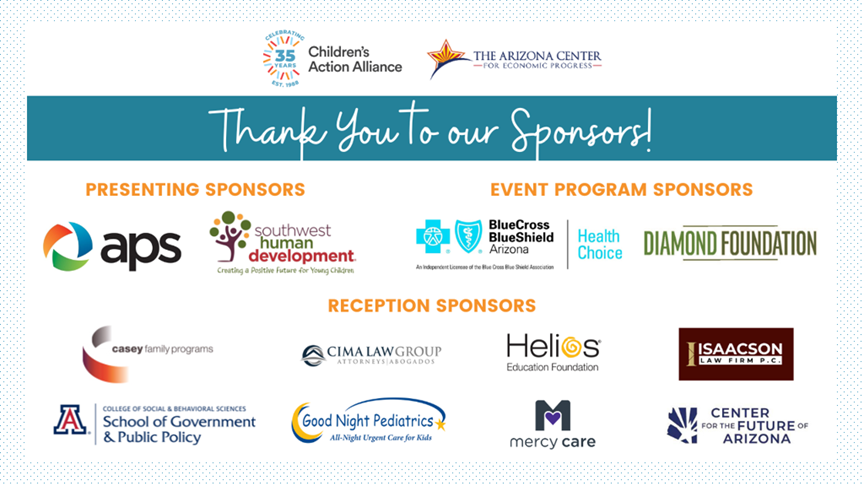Welcome our newest hires to Children's Action Alliance and the Arizona Center for Economic Progress.
 Sarah Bentley is the Communications Engagement Coordinator for both CAA and the AZCenter. She leads both state and federal advocacy outreach for issues like the Aggregate Expenditure Limit (AEL) school spending cap, and Paid Family and Medical Leave (PFML). Prior to joining the team, she worked as a Public Affairs Executive at Rose Allyn Public Relations where she specialized in crisis control, event management, and investor relations. During the pandemic, Sarah served as a Policy Intern for Phoenix Mayor Kate Gallego where she handled constituent concerns and community outreach. Sarah holds a Bachelor’s degree in Public Service and Public Policy as well as a Bachelor’s degree in Sustainability from Arizona State University. She is excited to use her experience in community engagement to advance the mission and policy agenda of CAA and the AZCenter.
Sarah Bentley is the Communications Engagement Coordinator for both CAA and the AZCenter. She leads both state and federal advocacy outreach for issues like the Aggregate Expenditure Limit (AEL) school spending cap, and Paid Family and Medical Leave (PFML). Prior to joining the team, she worked as a Public Affairs Executive at Rose Allyn Public Relations where she specialized in crisis control, event management, and investor relations. During the pandemic, Sarah served as a Policy Intern for Phoenix Mayor Kate Gallego where she handled constituent concerns and community outreach. Sarah holds a Bachelor’s degree in Public Service and Public Policy as well as a Bachelor’s degree in Sustainability from Arizona State University. She is excited to use her experience in community engagement to advance the mission and policy agenda of CAA and the AZCenter.
 Matt Jewett returned to the role of CAA's Director of Health Policy in March 2023, having previously worked in that role and as CAA’s Research Associate from 2004 to 2013. He has led outreach campaigns that increased AHCCCS and KidsCare health insurance enrollment. Overseeing grants for Mountain Park Health Center from 2013 to 2023, Matt managed up to $35 million a year in grant funds, including for the construction of a new clinic. Matt was a member of the Creighton Elementary School District Governing Board in Phoenix for six years. He is a graduate of the University of Arizona, has studied graduate-level public health at A.T. Still University, and enjoys a good cup of tea, growing his vinyl collection, and exploring his home state of Arizona…and the world.
Matt Jewett returned to the role of CAA's Director of Health Policy in March 2023, having previously worked in that role and as CAA’s Research Associate from 2004 to 2013. He has led outreach campaigns that increased AHCCCS and KidsCare health insurance enrollment. Overseeing grants for Mountain Park Health Center from 2013 to 2023, Matt managed up to $35 million a year in grant funds, including for the construction of a new clinic. Matt was a member of the Creighton Elementary School District Governing Board in Phoenix for six years. He is a graduate of the University of Arizona, has studied graduate-level public health at A.T. Still University, and enjoys a good cup of tea, growing his vinyl collection, and exploring his home state of Arizona…and the world.
 As an Economic Policy Analyst for the AZCenter, Connor Leavy Murphy performs data analysis, research, and advocacy to advance policy solutions at both the state and federal level addressing poverty, economic well-being, and a fairer tax code. Most recently Connor was a Policy Analyst with the City of Santa Fe, New Mexico in the City Attorney’s Office and the Office of Legislation and Policy Innovation. Previously, Connor worked as a Field Organizer with the Arizona Democratic Party’s Coordinated Campaign, Mission for Arizona. In May 2020, Connor graduated from the Sandra Day O’Connor College of Law at Arizona State University with a Master of Legal Studies. Prior to earning his MLS, Connor worked as a Donald W. Reynolds Fellow with the Carnegie-Knight News21 Initiative, where he received the 2019 Robert F. Kennedy Journalism Award in the college category as a member of News21.
As an Economic Policy Analyst for the AZCenter, Connor Leavy Murphy performs data analysis, research, and advocacy to advance policy solutions at both the state and federal level addressing poverty, economic well-being, and a fairer tax code. Most recently Connor was a Policy Analyst with the City of Santa Fe, New Mexico in the City Attorney’s Office and the Office of Legislation and Policy Innovation. Previously, Connor worked as a Field Organizer with the Arizona Democratic Party’s Coordinated Campaign, Mission for Arizona. In May 2020, Connor graduated from the Sandra Day O’Connor College of Law at Arizona State University with a Master of Legal Studies. Prior to earning his MLS, Connor worked as a Donald W. Reynolds Fellow with the Carnegie-Knight News21 Initiative, where he received the 2019 Robert F. Kennedy Journalism Award in the college category as a member of News21.
 JoAnna Mendoza is the Executive Director of the AZCenter and a retired US Marine Veteran. After retiring from the Marine Corps, JoAnna worked for a foster licensing agency contracted by the State of Arizona to find homes for children in foster care and developmental homes for children and adults with special needs. A few years later, JoAnna transitioned to working with vulnerable veterans and found her way to serving in government again, as a Veteran Service Representative and the Deputy District Director for a Member of Congress from the Arizona Congressional Delegation. JoAnna holds a Bachelor’s Degree in Intelligence Studies, a Master’s of Science in Leadership with an emphasis on disaster preparedness, a Public Leadership Credential from Executive Education at Harvard Kennedy School, a Brand Management Certificate from Cornell, and a Professional Certificate in Social Media Management from Georgetown.
JoAnna Mendoza is the Executive Director of the AZCenter and a retired US Marine Veteran. After retiring from the Marine Corps, JoAnna worked for a foster licensing agency contracted by the State of Arizona to find homes for children in foster care and developmental homes for children and adults with special needs. A few years later, JoAnna transitioned to working with vulnerable veterans and found her way to serving in government again, as a Veteran Service Representative and the Deputy District Director for a Member of Congress from the Arizona Congressional Delegation. JoAnna holds a Bachelor’s Degree in Intelligence Studies, a Master’s of Science in Leadership with an emphasis on disaster preparedness, a Public Leadership Credential from Executive Education at Harvard Kennedy School, a Brand Management Certificate from Cornell, and a Professional Certificate in Social Media Management from Georgetown.
 Franklin Zyriek is an Economic Policy Analyst for the AZCenter and joins the team after serving as a legislative correspondent in Senator Kyrsten Sinema’s Office. In that role, he worked on energy, environmental, public lands, and Tribal issues and supported Senator Sinema’s actions on the U.S. Senate Committee on Commerce, Science, and Transportation. Franklin grew up in Tempe and is a proud product of Arizona’s public K-12 schools. He earned his Master’s in Public Policy degree from American University as well as a B.A. in Communications, Legal Institutions, Economics, and Government and a Certificate in Advanced Leadership Studies from AU. Other previous roles include serving as a deputy field organizer for the Biden presidential campaign in Iowa and graduate legislative intern in Salt River Project’s federal affairs office in D.C.
Franklin Zyriek is an Economic Policy Analyst for the AZCenter and joins the team after serving as a legislative correspondent in Senator Kyrsten Sinema’s Office. In that role, he worked on energy, environmental, public lands, and Tribal issues and supported Senator Sinema’s actions on the U.S. Senate Committee on Commerce, Science, and Transportation. Franklin grew up in Tempe and is a proud product of Arizona’s public K-12 schools. He earned his Master’s in Public Policy degree from American University as well as a B.A. in Communications, Legal Institutions, Economics, and Government and a Certificate in Advanced Leadership Studies from AU. Other previous roles include serving as a deputy field organizer for the Biden presidential campaign in Iowa and graduate legislative intern in Salt River Project’s federal affairs office in D.C.
Meet the CAA and AZCenter teams






 Sarah Bentley is the Communications Engagement Coordinator for both CAA and the AZCenter. She leads both state and federal advocacy outreach for issues like the Aggregate Expenditure Limit (AEL) school spending cap, and Paid Family and Medical Leave (PFML). Prior to joining the team, she worked as a Public Affairs Executive at Rose Allyn Public Relations where she specialized in crisis control, event management, and investor relations. During the pandemic, Sarah served as a Policy Intern for Phoenix Mayor Kate Gallego where she handled constituent concerns and community outreach. Sarah holds a Bachelor’s degree in Public Service and Public Policy as well as a Bachelor’s degree in Sustainability from Arizona State University. She is excited to use her experience in community engagement to advance the mission and policy agenda of CAA and the AZCenter.
Sarah Bentley is the Communications Engagement Coordinator for both CAA and the AZCenter. She leads both state and federal advocacy outreach for issues like the Aggregate Expenditure Limit (AEL) school spending cap, and Paid Family and Medical Leave (PFML). Prior to joining the team, she worked as a Public Affairs Executive at Rose Allyn Public Relations where she specialized in crisis control, event management, and investor relations. During the pandemic, Sarah served as a Policy Intern for Phoenix Mayor Kate Gallego where she handled constituent concerns and community outreach. Sarah holds a Bachelor’s degree in Public Service and Public Policy as well as a Bachelor’s degree in Sustainability from Arizona State University. She is excited to use her experience in community engagement to advance the mission and policy agenda of CAA and the AZCenter. Matt Jewett returned to the role of CAA's Director of Health Policy in March 2023, having previously worked in that role and as CAA’s Research Associate from 2004 to 2013. He has led outreach campaigns that increased AHCCCS and KidsCare health insurance enrollment. Overseeing grants for Mountain Park Health Center from 2013 to 2023, Matt managed up to $35 million a year in grant funds, including for the construction of a new clinic. Matt was a member of the Creighton Elementary School District Governing Board in Phoenix for six years. He is a graduate of the University of Arizona, has studied graduate-level public health at A.T. Still University, and enjoys a good cup of tea, growing his vinyl collection, and exploring his home state of Arizona…and the world.
Matt Jewett returned to the role of CAA's Director of Health Policy in March 2023, having previously worked in that role and as CAA’s Research Associate from 2004 to 2013. He has led outreach campaigns that increased AHCCCS and KidsCare health insurance enrollment. Overseeing grants for Mountain Park Health Center from 2013 to 2023, Matt managed up to $35 million a year in grant funds, including for the construction of a new clinic. Matt was a member of the Creighton Elementary School District Governing Board in Phoenix for six years. He is a graduate of the University of Arizona, has studied graduate-level public health at A.T. Still University, and enjoys a good cup of tea, growing his vinyl collection, and exploring his home state of Arizona…and the world. As an Economic Policy Analyst for the AZCenter, Connor Leavy Murphy performs data analysis, research, and advocacy to advance policy solutions at both the state and federal level addressing poverty, economic well-being, and a fairer tax code. Most recently Connor was a Policy Analyst with the City of Santa Fe, New Mexico in the City Attorney’s Office and the Office of Legislation and Policy Innovation. Previously, Connor worked as a Field Organizer with the Arizona Democratic Party’s Coordinated Campaign, Mission for Arizona. In May 2020, Connor graduated from the Sandra Day O’Connor College of Law at Arizona State University with a Master of Legal Studies. Prior to earning his MLS, Connor worked as a Donald W. Reynolds Fellow with the Carnegie-Knight News21 Initiative, where he received the 2019 Robert F. Kennedy Journalism Award in the college category as a member of News21.
As an Economic Policy Analyst for the AZCenter, Connor Leavy Murphy performs data analysis, research, and advocacy to advance policy solutions at both the state and federal level addressing poverty, economic well-being, and a fairer tax code. Most recently Connor was a Policy Analyst with the City of Santa Fe, New Mexico in the City Attorney’s Office and the Office of Legislation and Policy Innovation. Previously, Connor worked as a Field Organizer with the Arizona Democratic Party’s Coordinated Campaign, Mission for Arizona. In May 2020, Connor graduated from the Sandra Day O’Connor College of Law at Arizona State University with a Master of Legal Studies. Prior to earning his MLS, Connor worked as a Donald W. Reynolds Fellow with the Carnegie-Knight News21 Initiative, where he received the 2019 Robert F. Kennedy Journalism Award in the college category as a member of News21. JoAnna Mendoza is the Executive Director of the AZCenter and a retired US Marine Veteran. After retiring from the Marine Corps, JoAnna worked for a foster licensing agency contracted by the State of Arizona to find homes for children in foster care and developmental homes for children and adults with special needs. A few years later, JoAnna transitioned to working with vulnerable veterans and found her way to serving in government again, as a Veteran Service Representative and the Deputy District Director for a Member of Congress from the Arizona Congressional Delegation. JoAnna holds a Bachelor’s Degree in Intelligence Studies, a Master’s of Science in Leadership with an emphasis on disaster preparedness, a Public Leadership Credential from Executive Education at Harvard Kennedy School, a Brand Management Certificate from Cornell, and a Professional Certificate in Social Media Management from Georgetown.
JoAnna Mendoza is the Executive Director of the AZCenter and a retired US Marine Veteran. After retiring from the Marine Corps, JoAnna worked for a foster licensing agency contracted by the State of Arizona to find homes for children in foster care and developmental homes for children and adults with special needs. A few years later, JoAnna transitioned to working with vulnerable veterans and found her way to serving in government again, as a Veteran Service Representative and the Deputy District Director for a Member of Congress from the Arizona Congressional Delegation. JoAnna holds a Bachelor’s Degree in Intelligence Studies, a Master’s of Science in Leadership with an emphasis on disaster preparedness, a Public Leadership Credential from Executive Education at Harvard Kennedy School, a Brand Management Certificate from Cornell, and a Professional Certificate in Social Media Management from Georgetown. Franklin Zyriek is an Economic Policy Analyst for the AZCenter and joins the team after serving as a legislative correspondent in Senator Kyrsten Sinema’s Office. In that role, he worked on energy, environmental, public lands, and Tribal issues and supported Senator Sinema’s actions on the U.S. Senate Committee on Commerce, Science, and Transportation. Franklin grew up in Tempe and is a proud product of Arizona’s public K-12 schools. He earned his Master’s in Public Policy degree from American University as well as a B.A. in Communications, Legal Institutions, Economics, and Government and a Certificate in Advanced Leadership Studies from AU. Other previous roles include serving as a deputy field organizer for the Biden presidential campaign in Iowa and graduate legislative intern in Salt River Project’s federal affairs office in D.C.
Franklin Zyriek is an Economic Policy Analyst for the AZCenter and joins the team after serving as a legislative correspondent in Senator Kyrsten Sinema’s Office. In that role, he worked on energy, environmental, public lands, and Tribal issues and supported Senator Sinema’s actions on the U.S. Senate Committee on Commerce, Science, and Transportation. Franklin grew up in Tempe and is a proud product of Arizona’s public K-12 schools. He earned his Master’s in Public Policy degree from American University as well as a B.A. in Communications, Legal Institutions, Economics, and Government and a Certificate in Advanced Leadership Studies from AU. Other previous roles include serving as a deputy field organizer for the Biden presidential campaign in Iowa and graduate legislative intern in Salt River Project’s federal affairs office in D.C.